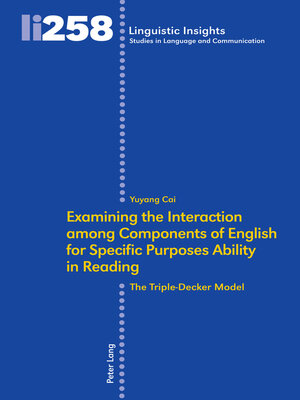Examining the Interaction among Components of English for Specific Purposes Ability in Reading
ebook ∣ The Triple-Decker Model · Linguistic Insights
By Maurizio Gotti

Sign up to save your library
With an OverDrive account, you can save your favorite libraries for at-a-glance information about availability. Find out more about OverDrive accounts.
Find this title in Libby, the library reading app by OverDrive.



Search for a digital library with this title
Title found at these libraries:
| Library Name | Distance |
|---|---|
| Loading... |
The book presents the Triple-Decker Model that describes the interactive mechanism among key constituents of English for Specific Purposes Ability (ESPA): language knowledge, strategic competence and background knowledge (nursing knowledge).
First, the model reveals that ESPA constituents can be assigned to three groups according to their roles in determining ESPA in reading: automators (language knowledge and background knowledge) that respond most directly, assistants (the cognitive aspect of strategic competence) that come to assist when automators are insufficient or boggle down, and regulators (the metacognitive aspect of strategic competence) that supervise all cognitive activities. Second, the model demonstrates the effect of strategic competence and background knowledge on ESPA fluctuated with the continuous increase of language knowledge.
The book also demonstrates the use of two innovative analytical techniques: composite scores based on bifactor multidimensional item response theory for scoring ESP reading tests and the multi-layered-moderation analysis (MLMA) for detecting linear and nonlinear moderation relations.







